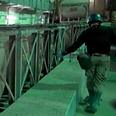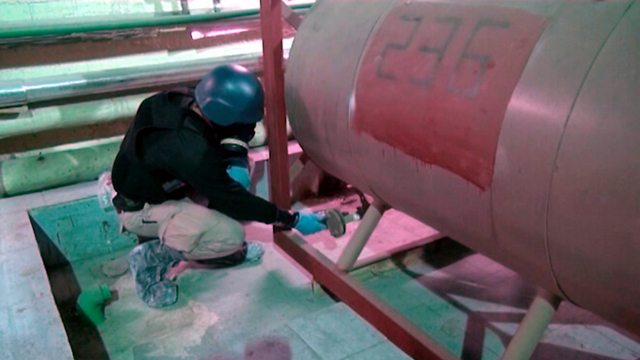
Difficult road for removing Assad's chemical weapons stock
Senior American officials voice concern over challenges facing removal process, call transport stage 'critical, vulnerable'
The proposed solution for the removal of Assad's chemical weapons stock – embraced by the international community – is proving more difficult than initially expected. According to a New York Times report, there is concern in Washington that the plan for the full transfer of chemical weapons outside of Syrian territory is a possible dud.
The proposal calls for transporting the weapons stock on roads which the rebels and the regime are fighting over, then loading the chemical components on a ship with no port of call.
Related stories:
- Syria: Hezbollah forces to join Battle of Qalamoun
- Syria: 31 troops killed by blast near Damascus
- The smiling dead: Recruiting rebels for Syria
Currently, the military units handling and securing the materials are forces loyal to Syrian President Bashar Assad. Senior American officials, from the intelligence and military communities, say that the chemical cargos are vulnerable to attack as they pass through battlegrounds in the civil war – either by the rebels or Assad's own units.
According to the NYT, when a senior American official was asked over the weekend about the back-up plan in the event the transports are attacked, he answered: "That’s the problem — no one has attempted this before in a civil war, and no one is willing to put troops on the ground to protect this stuff, including us."
Another senior American official mentioned that the dilemma staring at the decision-makers in the US and abroad was whether to "leave the stuff in place and hope for the best, or account for it, get it out of there, and hope for the best. That’s the ‘least worst’ option.”
No port of call for chemical stock
According to the agreement brokered by the Russians, the Assad regime committed to removing the most dangerous chemical components from Syria by December 31 and the rest of the material by February 5, 2014. But the problem does not end at port.
Even once the chemical stock is loaded onto a freighter; there is still no set destination where they are to be unloaded and destroyed. Last Friday, Albania turned down a request from the US to destroy the dangerous material on its territory because the Albanian public rose up in protest. Norway had rejected an earlier request.
The NYT report claims the pressing concern faced by the agreement is the 600 tons of "precursor material" stored in small 1-2 ton containers which could fall into volatile hands.
A senior Defense Department official told NYT that "the transportation stage of any operation is usually a critical, vulnerable stage."
The Organization for the Prohibition of Chemical Weapons (OPCW) offered its official plan on Friday to train Syrian forces to properly and safely transport the materials from 23 sites to the shore. The OPCW will be responsible for the cargo once it is on the high seas.
The agreement reached in September with the Syrian government laid the majority of the responsibility for the removal of weapons on Assad but tasked the United States and Russia with cooperating with the OPCW to assure the destruction of the chemical stock.
Challenge: Convoy security
Echoing other senior American personnel, one official said: "The biggest challenge we’re facing now is convoy security, from the sites to the port." Senior leaders of al-Qaeda in Pakistan – as well as official connected to the organization in Syria – have vocalized their wish to control the chemical materials, with an eye to developing an arsenal of their own.
One former senior White House official minimized the risk posed by terror organizations, who he told the New York Times do not possess the finesse to carry out the required operations, while another former senior White House official said relying on the Syrian regime for security of the material is not an ideal solution.
On the minds of these military and intelligence officials is the decade of experience gained by these organizations in attacking convoys in Iraq and Afghanistan. Still, the officials insist there is a gulf for these organizations to cross between attacking a convoy to cause physical damage and to seize the transported assets without damaging the cargo.
- Receive Ynetnews updates directly to your desktop











